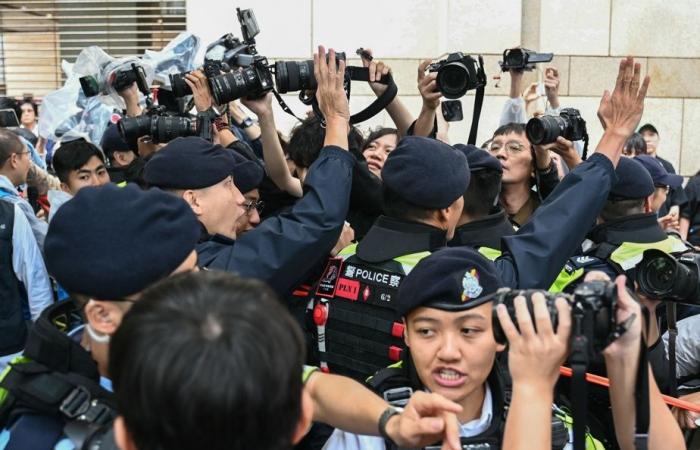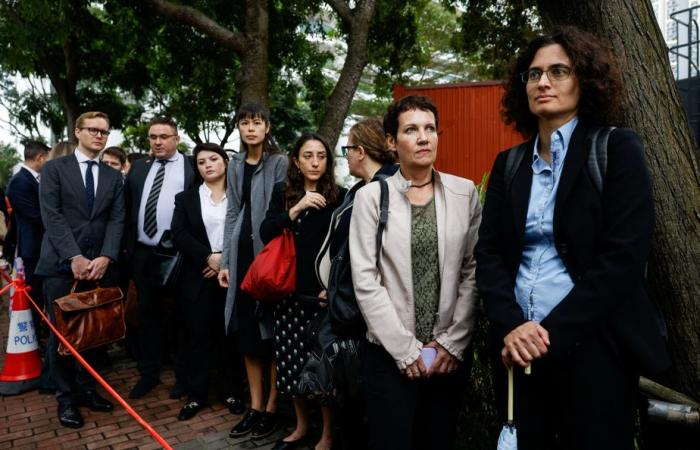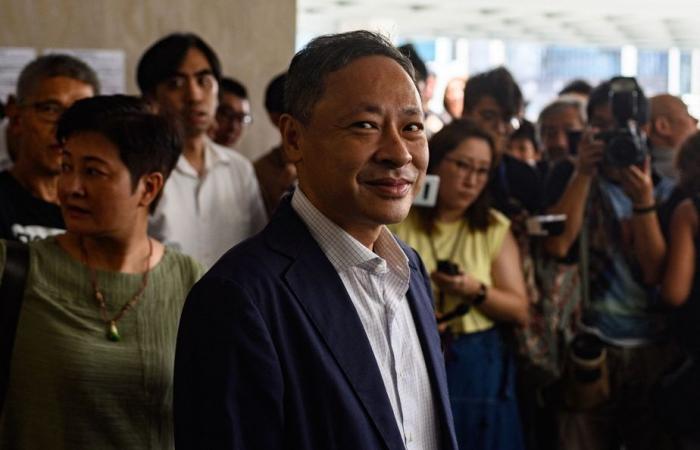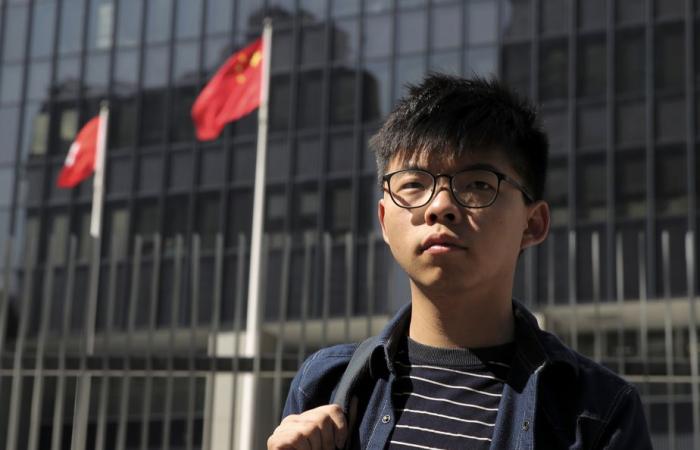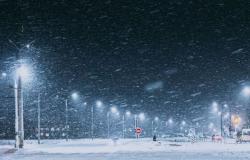Dozens of pro-democracy activists were sentenced to long prison terms for “subversion” on Tuesday in Hong Kong. They were arrested in the wake of the adoption of a controversial national security law.
Published at 6:00 a.m.
What you need to know
- Forty-five pro-democracy activists who were accused of “sedition” received heavy prison sentences.
- They participated in primaries in 2020 to nominate the candidates most likely to be elected to the Legislative Council and try to place themselves in a position of strength, arousing the disapproval of authorities close to Beijing.
- According to several experts, the national security law used to convict them has gradually eroded the fundamental freedoms that residents of the former colony had at the time of its handover to China.
The Chinese government, which imposed the law in 2020 to strengthen its control over the former British colony and put an end to major protests, welcomed the decision as proof that the rule of law is functioning well.
Instead, Beijing’s critics see it as further proof that the extensive rights Hong Kong residents were supposed to enjoy under the “one country, two systems” principle have been largely eroded.
Jeff Wasserstrom, an expert on the region at the University of California at Irvine, believes that the all-out application of the national security law has deprived the territory of its exceptional character compared to mainland China.
The differences that existed in terms of freedom of expression, freedom of the press or freedom of association “have completely disappeared or are marginal”, notes the researcher.
“The message these prison sentences send is that China cannot be trusted to keep its word since they promised to respect the rights of the people of Hong Kong for 50 years” after the handover of the colony in 1997, underlines Guy Saint-Jacques, former Canadian ambassador to China.
“The notion of national security is so vague that residents can be convicted of anything,” notes the former diplomat.
PHOTO TYRONE SIU, REUTERS
Many foreign diplomats visited the West Kowloon courthouse on Tuesday.
Benedict Rogers, of the Hong Kong Watch organization, notes that the sentences announced Tuesday “are appalling”, but hardly surprising due to the influence of the pro-Chinese authorities on the courts.
“The possibility that they will issue sentences contrary to Beijing’s wishes in this type of case is practically a thing of the past,” he said.
« Subversion »
The activists were accused of having “plotted” to subvert the state by trying to obtain a majority in Hong Kong’s Legislative Council which would allow them to block orders from Beijing.
In 2020, they organized primaries in which hundreds of thousands of people participated in the hope of identifying the candidates most likely to obtain popular support.
“The idea was to bring together all democratic forces in a final act of resistance,” notes Mr. Wasserstrom, who sees nothing “subversive” in this action through the ballot box.
“The plan could not be attempted anyway since the elections were delayed due to the pandemic,” underlines the researcher.
The arrests of 47 activists in connection with the primaries, which occurred in February 2021, made it possible to “suddenly remove the main opposition figures from circulation” and seriously undermine the protest movement which had shaken the former colony .
Among those sentenced is Benny Tai, a lawyer who was previously imprisoned for participating in protests in 2014 as part of the “Umbrella Revolution”. He was sentenced to 10 years in prison after being presented as the mastermind of the “plot”.

PHOTO PHILIP FONG, ARCHIVES AGENCE France-PRESSE
Benny Tai, in 2019
Another well-known activist, Joshua Wong, who had become known as one of the student leaders of the pro-democracy movement, received a sentence of four and a half years.
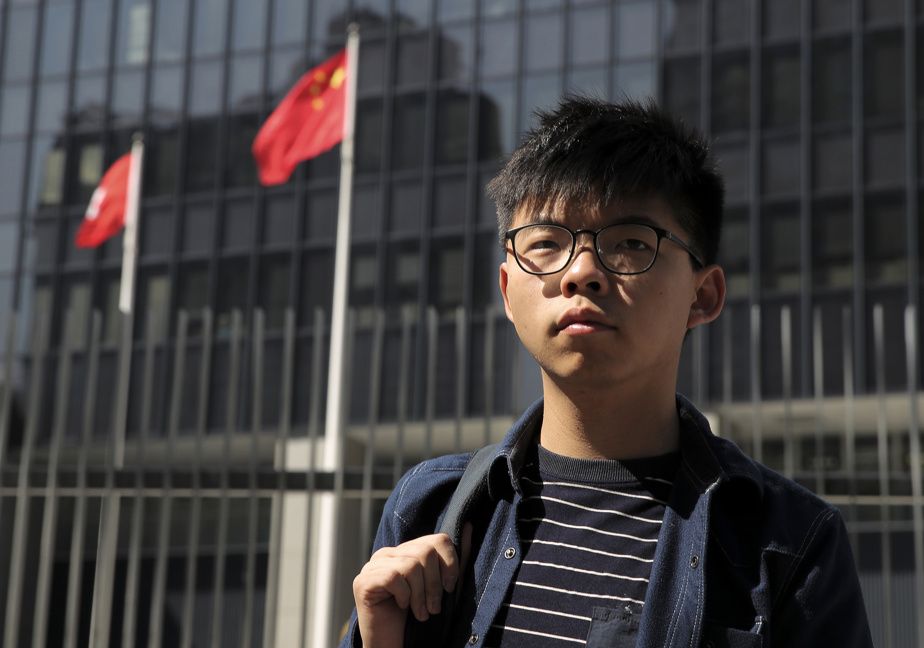
PHOTO KIN CHEUNG, ARCHIVES ASSOCIATED PRESS
Joshua Wong, en 2019
Journalists, lawyers, local elected officials and trade unionists are among the other people sentenced, who are aged between 27 and 68.
More than thirty had pleaded guilty in the hope of obtaining a reduced sentence, and 14 were sentenced in May following their trial.
Gwyneth Ho, who filmed several protests in 2019, indicated, in a public statement relayed by Agence France-Presse, that her trial had overtones of 1984in reference to the famous novel by George Orwell.
A repression that costs China
The use of the national security law by local authorities is causing concern among the business community and expatriates and has pushed companies to relocate elsewhere in Asia, Mr. Saint-Jacques points out.
We will certainly see more departures as the situation continues to deteriorate. The rule of law and the opening of Hong Kong were the keys to its success.
Benedict Rogers, de l’organisation Hong Kong Watch
Mr. Wasserstrom points out that tourism has fallen sharply, in part because of the pandemic, and is slow, he says, to recover as authorities strive to portray the former colony as a “happy” place.
A spokesperson for the Chinese Foreign Ministry, Lin Jian, said at a press briefing on Tuesday that Western countries were working to “smear” Hong Kong and its justice system by “using” the trial of the activists.
“No one should be able to use “democracy” as a pretext to engage in illegal actions and try to escape justice,” he stressed.

